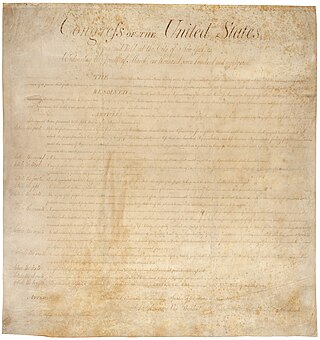
The Sixth Amendment to the United States Constitution sets forth rights related to criminal prosecutions. It was ratified in 1791 as part of the United States Bill of Rights. The Supreme Court has applied all but one of this amendment's protections to the states through the Due Process Clause of the Fourteenth Amendment.
The Domestic Violence Offender Gun Ban, often called the "Lautenberg Amendment", is an amendment to the Omnibus Consolidated Appropriations Act of 1997, enacted by the 104th United States Congress in 1996, which bans access to firearms for life by people convicted of crimes of domestic violence. The act is often referred to as "the Lautenberg Amendment" after its sponsor, Senator Frank Lautenberg (D-NJ). Lautenberg proposed the amendment after a decision from the United States Court of Appeals for the Ninth Circuit, involving underenforcement of domestic violence laws brought under the Equal Protection Clause of the Fourteenth Amendment to the United States Constitution. President Bill Clinton signed the law as part of the Omnibus Appropriations Act of 1997.
A pardon is a government decision to allow a person to be relieved of some or all of the legal consequences resulting from a criminal conviction. A pardon may be granted before or after conviction for the crime, depending on the laws of the jurisdiction.
An ex post facto law is a law that retroactively changes the legal consequences or status of actions that were committed, or relationships that existed, before the enactment of the law. In criminal law, it may criminalize actions that were legal when committed; it may aggravate a crime by bringing it into a more severe category than it was in when it was committed; it may change the punishment prescribed for a crime, as by adding new penalties or extending sentences; it may extend the statute of limitations; or it may alter the rules of evidence in order to make conviction for a crime likelier than it would have been when the deed was committed.

The Constitution of the Commonwealth of Puerto Rico is the primary organizing law for the unincorporated U.S. territory of Puerto Rico, describing the duties, powers, structures and functions of the government of Puerto Rico in nine articles. It was ratified by the electorate of the archipelago and island in a referendum on March 3, 1952 and proclaimed into effect by Governor Luis Muñoz Marín on July 25, 1952, celebrated as Constitution Day. As the constitution of a territory of the United States, it is bound by the Constitution of the United States.

The Unborn Victims of Violence Act of 2004 is a United States law that recognizes a "child in utero" as a legal victim, if they are injured or killed during the commission of any of over 60 listed federal crimes of violence. The law defines this term, “child in utero" as "a member of the species Homo sapiens, at any stage of development, who is carried in the womb."

The Constitution of the State of Tennessee defines the form, structure, activities, character, and fundamental rules of the U.S. State of Tennessee.
Title 18 of the United States Code is the main criminal code of the federal government of the United States. The Title deals with federal crimes and criminal procedure. In its coverage, Title 18 is similar to most U.S. state criminal codes, typically referred to by names such as Penal Code, Criminal Code, or Crimes Code. Typical of state criminal codes is the California Penal Code. Many U.S. state criminal codes, unlike the federal Title 18, are based on the Model Penal Code promulgated by the American Law Institute.

The United States Bill of Rights comprises the first ten amendments to the United States Constitution. Proposed following the often bitter 1787–88 debate over the ratification of the Constitution and written to address the objections raised by Anti-Federalists, the Bill of Rights amendments add to the Constitution specific guarantees of personal freedoms and rights, clear limitations on the government's power in judicial and other proceedings, and explicit declarations that all powers not specifically granted to the federal government by the Constitution are reserved to the states or the people. The concepts codified in these amendments are built upon those in earlier documents, especially the Virginia Declaration of Rights (1776), as well as the Northwest Ordinance (1787), the English Bill of Rights (1689), and Magna Carta (1215).
The Double Jeopardy Clause of the Fifth Amendment to the United States Constitution provides: "[N]or shall any person be subject for the same offence to be twice put in jeopardy of life or limb..." The four essential protections included are prohibitions against, for the same offense:

Proposition 8, a law enacted by California voters on 8 June 1982 by the initiative process, restricted the rights of convicts and those suspected of crimes and extended the rights of victims. To do so, it amended the California Constitution and ordinary statutes.

Marsy's Law, the California Victims' Bill of Rights Act of 2008, enacted by voters as Proposition 9 through the initiative process in the November 2008 general election, is an amendment to the state's constitution and certain penal code sections. The act protects and expands the legal rights of victims of crime to include 17 rights in the judicial process, including the right to legal standing, protection from the defendant, notification of all court proceedings, and restitution, as well as granting parole boards far greater powers to deny inmates parole. Critics allege that the law unconstitutionally restricts defendant's rights by allowing prosecutors to withhold exculpatory evidence under certain circumstances, and harms victims by restricting their rights to discovery, depositions, and interviews.
A citizen's right to a trial by jury is a central feature of the United States Constitution. It is considered a fundamental principle of the American legal system.
The Crime Victims' Rights Act, (CVRA) 18 U.S.C. § 3771, is part of the United States Justice for All Act of 2004, Pub. L. No. 108-405, 118 Stat. 2260. The CVRA enumerates the rights afforded to victims in federal criminal cases and victims of offenses committed in the District of Columbia. The Act grants victims the following eight rights:
- The right to be reasonably protected from the accused.
- The right to reasonable, accurate, and timely notice of any public court proceeding, or any parole proceeding, involving the crime or of any release or escape of the accused.
- The right not to be excluded from any such public court proceeding, unless the court, after receiving clear and convincing evidence, determines that testimony by the victim would be materially altered if the victim heard other testimony at that proceeding.
- The right to be reasonably heard at any public proceeding in the district court involving release, plea, sentencing, or any parole proceeding.
- The reasonable right to confer with the attorney for the Government in the case.
- The right to full and timely restitution as provided in law.
- The right to proceedings free from unreasonable delay.
- The right to be treated with fairness and with respect for the victim’s dignity and privacy.
The Vicinage Clause is a provision in the Sixth Amendment to the United States Constitution regulating the vicinity from which a jury pool may be selected. The clause says that the accused shall be entitled to an "impartial jury of the State and district wherein the crime shall have been committed, which district shall have been previously ascertained by law". The Vicinage Clause limits the vicinity of criminal jury selection to both the state and the federal judicial district where the crime has been committed. This is distinct from the venue provision of Article Three of the United States Constitution, which regulates the location of the actual trial.

The Crimes Act of 1790, formally titled An Act for the Punishment of Certain Crimes Against the United States, defined some of the first federal crimes in the United States and expanded on the criminal procedure provisions of the Judiciary Act of 1789. The Crimes Act was a "comprehensive statute defining an impressive variety of federal crimes".

Marsy's Law for Illinois, formally called the Illinois Crime Victims' Bill of Rights, amended the 1993 Rights of Crime Victims and Witnesses Act by establishing additional protections for crime victims and their families. Voters approved the measure as a constitutional amendment on November 4, 2014. It became law in 2015.
United States v. Haymond, 588 U.S. ___ (2019), is a case in which the U.S. Supreme Court struck down the five-year mandatory minimum prison sentence for certain sex offenses committed by federal supervised releases under 18 U.S.C. § 3583(k) as unconstitutional unless the charges are proven to a jury beyond a reasonable doubt. Justices Ginsburg, Sotomayor, and Kagan joined Gorsuch's plurality opinion, while Breyer provided the necessary fifth vote with his narrow concurrence that began by saying he agreed with much of Justice Alito's dissent, which was joined by Justices Roberts, Thomas, and Kavanaugh.

On November 3, 1992, Illinois voters approved the Crime Victim Rights Amendment, a legislatively referred constitutional amendment which added Article I, Section 8.1 to the Illinois Constitution of 1970. This amendment guaranteed crime victims certain rights, including the right to receive information about cases in which they are involved.

In the United States, federal impeachment is the process by which the House of Representatives charges the president, vice president, or another civil federal officer for alleged misconduct. The House can impeach an individual with a simple majority of the present members or other criteria adopted by the House according to Article One, Section 2, Clause 5 of the U.S. Constitution.









